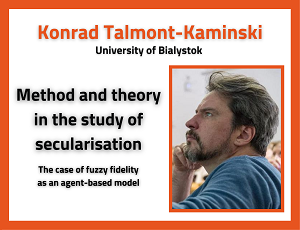
BIO
Konrad Talmont-Kaminski is the Head of the Society & Cognition Unit at the University of Bialystok. His research focuses on the cognitive and evolutionary basis of religion. Konrad studied at the University of Melbourne and the University of Western Ontario.
He received his doctorate in philosophy from Monash University in Australia and was a fellow of the Konrad Lorenz Institute for Evolution and Cognition Research in Vienna.
In 2014 he published Religion as a Magical Ideology with Routledge. In that book he argued that religions combine reliance upon cognitive by-products typical of magical beliefs and practices, as well as the function of motivating prosocial behaviour typical of ideologies. Since then, he has pursued a number of collaborative empirical efforts to explore various aspects of the account presented in his book.
TITLE OF THE TALK
Method and theory in the study of secularisation: the case of fuzzy fidelity as an agent-based model.
ABSTRACT
Secularisation is a phenomenon that is at once both social and individual. It is social in so far as the process as whole takes place on the social scale –the gradual fall of the average levels of religiosity within affected societies; a process that takes several generations. As such it can not be understood by merely looking at the individual scale, upon which the overall pattern of change would not be visible. At the same time, any explanation of secularisation has to take into account the mechanisms that do work at the individual scale, as – at its base – the phenomenon involves changes in how individuals are socialised, such that on average they end up less religious than their parents. Yet, it is beyond normal human comprehension to see how what happens in a particular family on a given Sunday connects causally with the overall social pattern of change. The standard way scientists have dealt with this issue traditionally is by focussing on just the social patterns or the individual psychological/cognitive mechanisms and abstracting away from the other level of the phenomenon under investigation. The result all too often has been social theories that treat the underlying mechanisms as black boxes, formulating hypotheses on a post hoc basis, as well as psychological accounts that somehow forget the significance of the social environment and attempt to explain everything by dint of individual cognitive differences. The solution is to expand our methodology by taking advantage of computer modelling technology that allows us to simulate both the individual and the social simultaneously as part of an agent-based model. During my talk I will describe the methodology we have been using with our Norwegian partners in developing formal accounts of secularising societies that take into consideration both the cognitive and the social aspects of the phenomenon. In particular, I will go through the process of developing a model of David Voas’ fuzzy fidelity theory, explain the results we have been able to obtain, and describe the steps we plan to undertake in the future to develop the theory further.
